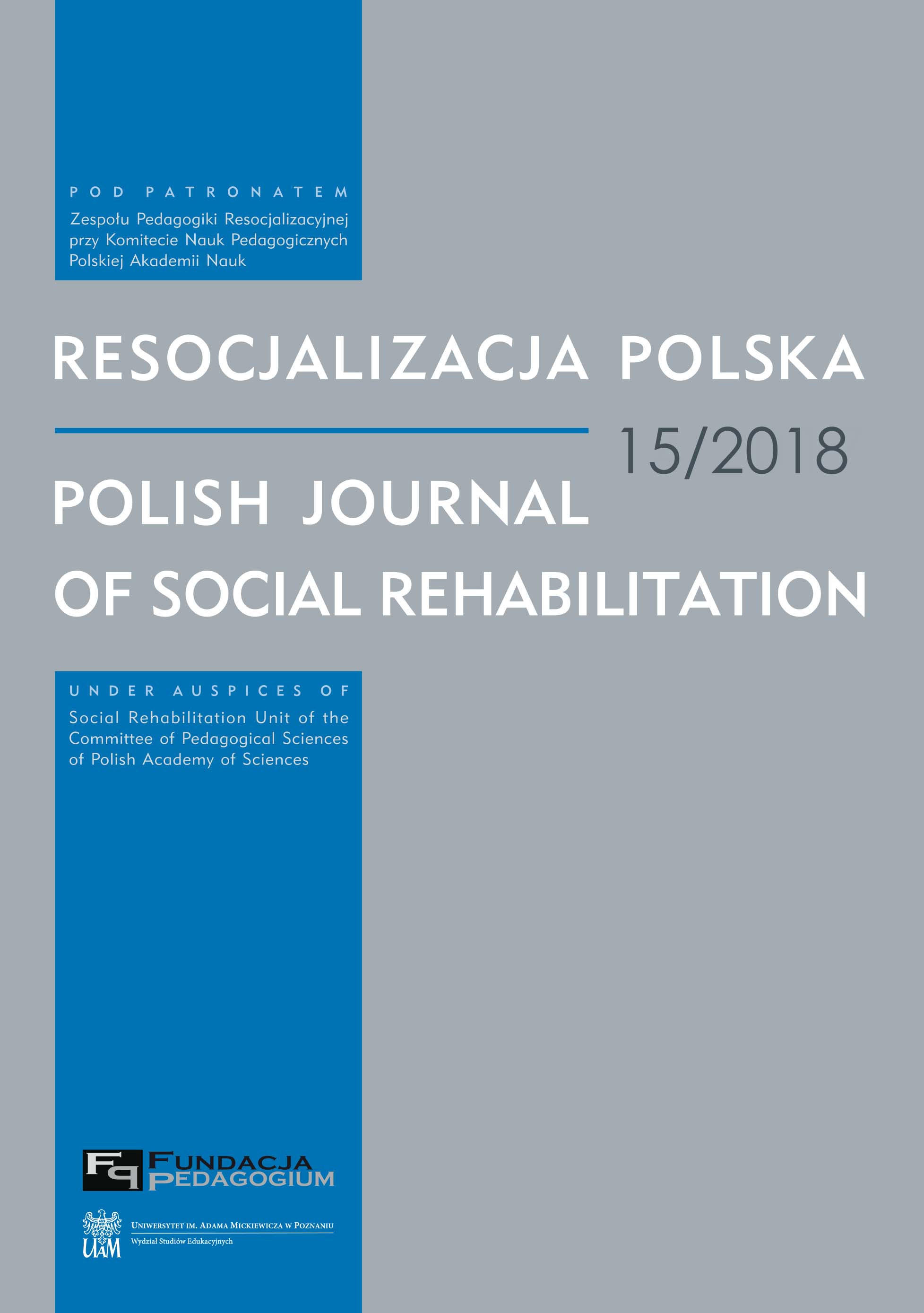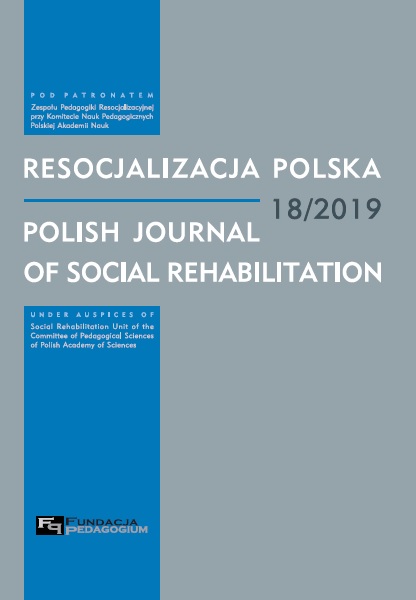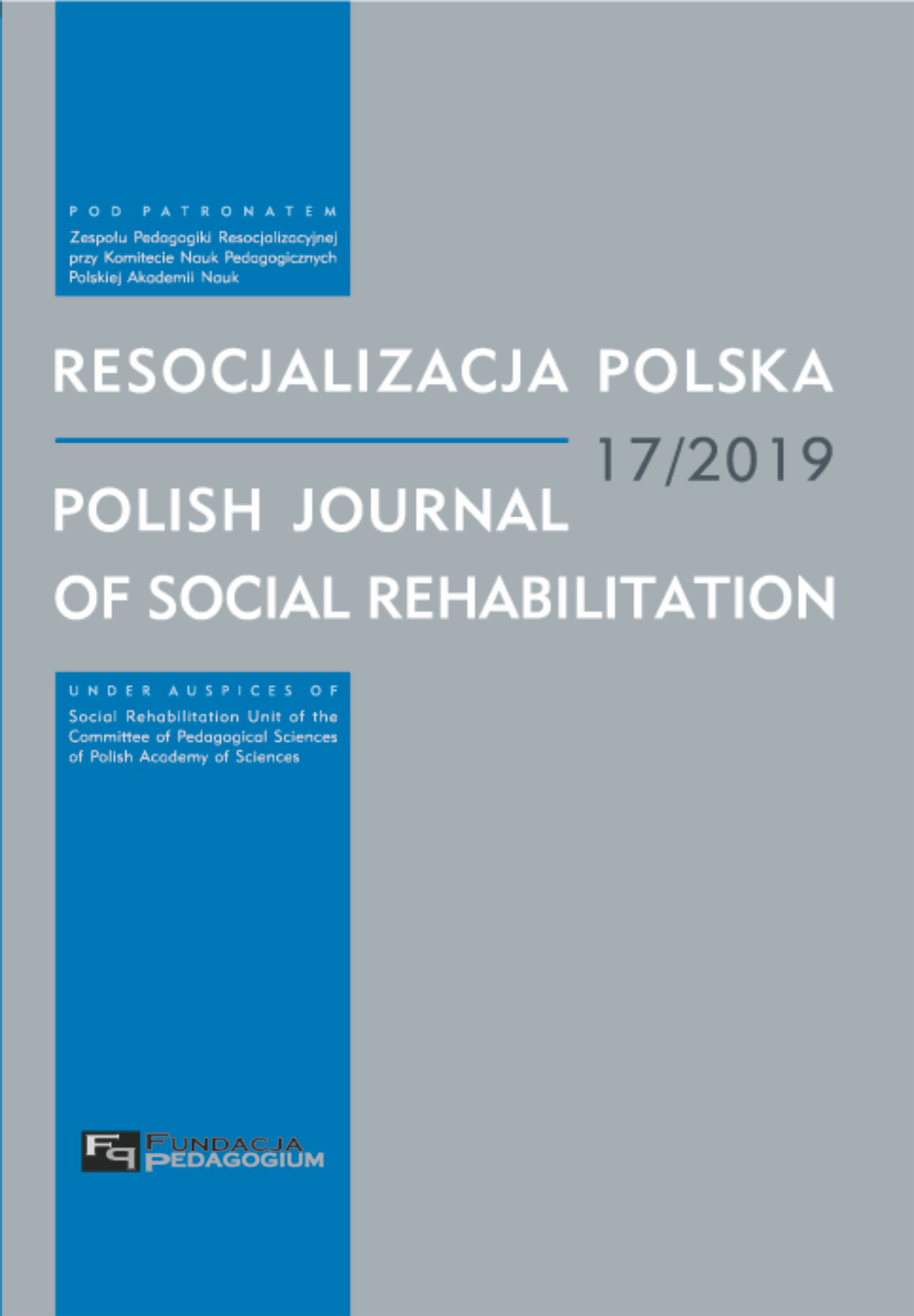Author(s): Stanisław Leszek Stadniczeńko,Stanislaw Leszek Stadniczeńko / Language(s): Polish
Issue: 2/2019
The article deals with the personal and social potential of court probation in Poland. It shows how probation officers can apply methods of creative social rehabilitation in their professional work, by supporting the development of cognitive and creative structures of their wards by means of implemented strategies and methodological recommendations based on the assumptions of the heuristic concept.The article discusses issues related to the evolution of probation as a service to the child, considering it a variable social construct determined by various discourses. The premise of this claim is the phenomenological assumption that life is complex, undefined and based on interaction between people. “Society […] is a symbolic creation made up of concepts, their meanings and language, constantly changing through human activity, limiting and enablingit” (Parton 2003, p. 5). The aspects of the professionalization of the probation officer’s work in the service for children are presented in relation to the complex current reality, i.e. “post”, post-truth, post-politics, post-secularism, post-humanism and post-modernism (post-modernity). The terminology reflects social change in relation to the other concepts considered. The literature deals with very widely raised issues that are related to the crisis of reality. It should be noted that it was the concept of post-truth that paved the way for the world of politics and political debate, in order to achieve triumph by being recognized as the word of the year in 2016 by the editors of the Oxford Dictionary. The matter is very complex, because the mentioned “post” replaces previous concepts with a different perception of the world and we are not sure about the direction of these changes. The inclusion of this issue in the probation officers’ work indicates their entanglement with the current reality in which they function. So it is only a signal to understand the complexity of the probation officers’ work and their functionin a difficult reality. All complex environmental factors influence the way we perceive care, provision probation and other concepts. Relationships are considered to be at the core of the constructionist concept of probation aswell as the adopted reflectiveness, i.e. a direct transition from knowledge to action. The main theme of the considerations is that the legal regulations contained in the principles of the Convention on the Rights of the Child occupy an extremely important place here. The term “human person” is very important, especially since it is associated with two fundamental – for thinking about human rights – categories: the dignity and value of the human person as essential properties of humanity and human subjectivity. Reflection on the service for children is related to the execution of court judgments and bringing the law into effect in the environment of activity. The study deals with the beginnings of the regulation of probation and its development as well as the social role of probation officers in the context of responsibility and participation in creating order, social and legal order in society, bringing the rights of the child into effect. The analysis was carried out in the scope of realistic understanding of human being as a person, hence it was embedded in the area of human rights protection, including the rights of the child. It was considered necessary to take into account the context of philosophical anthropology, which refers to the establishment of human rights to understand man as a person, as this theory best corresponds to common sense cognition. At the same time, the organic relationship between human rights and the objective order of human nature has been taken into account, which is manifested not only in common sense cognition, but also in the historical development of this issue and in philosophical and anthropological reflection.W artykule podjęto zagadnienia związane z ewolucją kurateli jako służby dziecku uznając ją za zmienny konstrukt społeczny zdeterminowany przez różne dyskursy. Przesłanką tego twierdzenia jest fenomenologiczne założenie, że życie jest złożone, nieokreślone i opiera się na interakcji między ludźmi. „Społeczeństwo […] jest symbolicznym tworem złożonym z pojęć, ich znaczeń oraz języka, stale zmieniającego się poprzez działania ludzi, ograniczającego i umożliwiającego to działanie” (Parton, 2003, s. 5).Przedstawiono aspekty profesjonalizacji pracy kuratora w służbie dziecku w odniesieniu do złożonej aktualnej rzeczywistości, tj. „post”, postprawdy, postpolityki, postsekularyzmu, posthumanizmu oraz postmodernizmu (postnowoczesności). Terminologia odzwierciedla zmiany społeczne w odniesieniu do innych rozważanych pojęć. W literaturze podejmowane są bardzo szeroko podnoszone zagadnienia, które mają związek z kryzysem rzeczywistości. Należy zwrócić uwagę, że właśnie pojęcie postprawdy utorowało sobie drogę do świata polityki i debaty politycznej, by osiągnąć tryumf poprzez uznanie je za słowo roku w 2016 r. przez redakcję Słownika Oxfordzkiego. Sprawa jest bardzo złożona, gdyż wymienione „post” w zamian dotychczasowych pojęć włącza inne postrzeganie świata i nie mamy pewności co do kierunku tych zmian.Uwzględnienie tego zagadnienia w pracy kuratora wskazuje na uwikłanie go w splot aktualnej rzeczywistości, w której funkcjonuje. Jest to więc tylko sygnał do zrozumienia złożoności pracy kuratora i pełnionej przez niego funkcji w trudnej rzeczywistości. Wszystkie złożone czynniki środowiskowe wpływają na sposób, w jaki postrzegamy troskę, opiekę, kuratelę i inne pojęcia.Uznaje się, że relacje leżą u podstaw konstrukcjonistycznej koncepcji kurateli a także przyjętej refleksyjności, czyli bezpośredniego przejścia od wiedzy do działania.Zasadniczy wątek podejmowanych rozważań wymaga zwrócenia uwagi na fakt, że wyjątkowo ważne miejsce zajmują tu regulacje prawne, zawarte w zasadach Konwencji o prawach dziecka.Termin „osoba ludzka” jest wielce ważny, zwłaszcza, że zostaje powiązany z dwiema fundamentalnymi – dla myślenia o prawach człowieka – kategoriami: godności i wartości osoby ludzkiej jako istotowymi właściwościami człowieczeństwa i ludzkiej podmiotowości.Refleksja na temat służby dziecku z natury rzeczy ma ogromne znaczenie w perspektywie tworzenia dobra, urzeczywistniania praw dziecka i rodziny. Prawo jest tym, co kieruje działaniami i relacjami międzyludzkimi, a więc regułą i miarą działania organizując je do celu.Autor zwraca uwagę na związek proklamowanych i chronionych praw z dobrem dziecka i niezwykle złożonymi zagadnieniami społeczno-prawnymi. Rozumienie prawa i praw człowieka jako podstawy służby staje się więc fundamentem pełnionej funkcji kuratorskiej. Wydaje się, że poszerzenie rozumienia prawniczego o prawo jako relację do należnych stanów rzeczy o rozumienie filozoficzne oraz prawo jako powinnościowej relacji międzyosobowej może wyjaśnić fenomen praw dziecka.Niezwykłą okazją do przedstawienia refleksji stanowi 60-lecie Deklaracji praw dziecka (ONZ 1959 r.) oraz 30-lecie ustanowienia Konwencji o prawach dziecka (ONZ 1989 r.) a także 100-lecie kurateli w Polsce, która ewaluowała na przestrzeni tego czasu od modelu kurateli społeczno-zawodowej do zawodowo-społecznego realizującego zadania o charakterze wychowawczo-resocjalizacyjnym, profilaktycznym, diagnostycznym, kontrolnym, związanym z wykonywaniem orzeczeń Sądu oraz urzeczywistniania prawa w środowisku działania.Opracowanie traktuje o początkach regulacji kurateli i jej rozwoju jak i społecznej roli zawodowej kuratora w kontekście problematyki odpowiedzialności i udziału w kreowaniu porządku, ładu społeczno-prawnego w społeczeństwie – urzeczywistniania praw dziecka. Analizę przeprowadzono w nurcie realistycznego rozumienia człowieka jako osoby, stąd też osadzona została w obszarze ochrony praw człowieka, w tym praw dziecka.Uznano za niezbędne uwzględnienie kontekstu antropologii filozoficznej odwołującej się w ugruntowaniu ludzkich uprawnień do rozumienia człowieka jako osoby, jako że teoria ta najlepiej koresponduje z poznaniem zdroworozsądkowym. Uwzględniono jednocześnie organiczny związek pomiędzy prawami człowieka a obiektywnym porządkiem natury ludzkiej, co właśnie przejawia się nie tylko w zdrowo-rozsądkowym poznaniu lecz również w rozwoju historycznym tej problematyki oraz refleksji filozoficzno-antropologicznej.
More...



